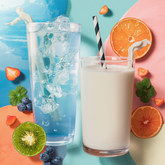Recently, plant milk has been leading the charge. As more people embrace the idea of reducing their carbon footprint and adopting a more sustainable lifestyle, the demand for plant-based milk products has surged. However, as the popularity of plant milk production grows, so do concerns about its sustainability. In this blog, we will explore some of the key issues surrounding the sustainability of plant milk production and the efforts being made to address them.
- Land Use and Agricultural Practices
One of the primary concerns related to plant milk sustainability is the impact of large-scale agriculture. The cultivation of crops such as soy, almonds, and oats requires significant land, water, and other resources. This can lead to deforestation, habitat destruction, and strain on local ecosystems. Sustainable farming practices, such as agroforestry and regenerative agriculture, are becoming increasingly important to mitigate these impacts.

- Water Usage
Water scarcity is a critical global issue, and the production of plant-based milk is not exempt from its implications. Almond milk, in particular, has come under scrutiny for its high water requirements. However, it's worth noting that different plant milk varieties have varying water footprints. For instance, oat and pea milk generally have lower water requirements compared to almond milk. As the industry evolves, there is a growing emphasis on water conservation measures and the development of plant varieties that are more resilient to arid conditions.

- Processing and Packaging
The sustainability of plant milk extends beyond agricultural practices to the processing and packaging stages. The energy-intensive processes involved in turning raw ingredients into the final product can contribute to the overall environmental impact. Additionally, packaging materials, especially single-use plastics, raise concerns about waste management.
For consumers, an impactful way to address the packaging issue is to make plant milk at home. By doing so, individuals can control the ingredients, reduce their reliance on store-bought products, and eliminate the need for packaging altogether. This DIY approach not only minimizes environmental impact but also empowers consumers to actively participate in sustainable practices.
- Transportation and Supply Chain
The global nature of the food industry means that ingredients for plant milk often travel long distances before reaching consumers. This transportation contributes to greenhouse gas emissions and raises questions about the overall sustainability of the supply chain. Local sourcing, investing in renewable energy for transportation, and optimizing distribution networks are strategies being explored to minimize the environmental impact of the plant milk industry.

- Waste Utilization
Agricultural by-products and waste generated during the production of plant milk present both challenges and opportunities. Finding innovative ways to repurpose by-products can contribute to a more circular and sustainable economy. For example, using almond meal as animal feed or incorporating it into food products can reduce waste and add value to the production process.
When making plant milk at home, individuals can take sustainability a step further by utilizing the leftovers. The pulp generated during the process can be repurposed in cooking or baking, adding nutritional value to various recipes and minimizing waste.
While the surge in plant milk consumption aligns with the growing interest in sustainable and plant-based diets, it is crucial to address the associated environmental concerns. Producers, consumers, and policymakers all play roles in shaping the future of plant milk sustainability. By advocating for responsible sourcing, adopting eco-friendly practices, and supporting initiatives that prioritize environmental stewardship, we can navigate the challenges and work towards a more sustainable future for plant milk production. The choices we make, both at the producer and consumer levels, can contribute to a positive ripple effect for the planet.
To take an active step in contributing positively to plant milk sustainability, we suggest trying Milky Plant. With Milky Plant, you can craft your plant milk at home in just 3 minutes—mess-free, package-free, and waste-free. This innovative solution empowers individuals to embrace a sustainable lifestyle by providing a convenient and eco-friendly alternative to store-bought plant milk. By making conscious choices in our daily lives, we can collectively shape a future where plant milk production aligns seamlessly with environmental stewardship.















